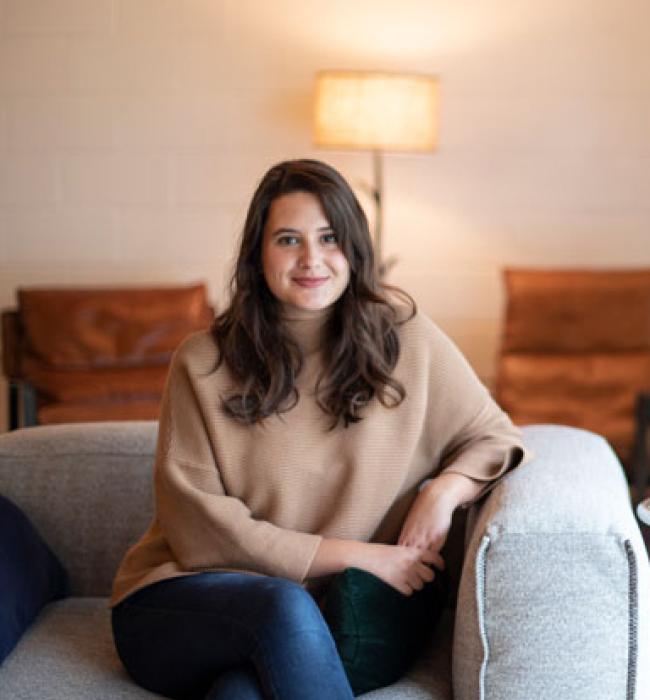
Elizabeth Minchey
Communication & Leadership
Class of 2018
Elizabeth Minchey enrolled at The University of Texas in 2015, one year before the Moody College of Communication initiated the communication and leadership undergraduate degree.
She originally majored in English because of her proficiency with words and rhetoric, but was compelled to switch after receiving an email promoting the new degree plan.
Minchey graduated in 2018 as the first with a communication and leadership degree, and her aim was to have a full-time job within six months. In the meantime, she balanced three part-time jobs: marketing manager for Handsome, talent advocate for SalsaMobi and social media manager for Voltage Control. Through these experiences, she deciphered which fields interested her the most, eventually leading her to stay with Handsome — an Austin-based brand design agency.
Within six months, she became the business development operations manager at Handsome. In her role, Minchey builds and maintains client relationships, develops project agreements between the clients and Handsome employees and maintains the organizational structure of the company.
In the future, she hopes to attend the University of Edinburgh in Scotland to receive her master’s in social anthropology.
Be humble and always ready to learn. I never tried to present myself as an expert, a know-it-all or somebody who has it all figured out.
What drew you to the communication and leadership degree?
There was something about it that really spoke to me — all of what came with that degree using the hard skills of communication foundations and the soft skills of ethical leadership, social justice and things that personally interest me, such as being a good person and creating a working environment where people can thrive.
Why did you develop a degree plan to include business and English minors?
Getting a business minor, I learned the actual inner-workings of a business. It informs you to be a practically good business person, but the communication and leadership degree teaches you how to actually be a good person in a leadership position within a company. We learned how to be an ethical leader. English teaches you how to be so much more empathetic as a person because it’s opening your mind to a lot of different perspectives.
Together, it gave me a really well-rounded education and covered all the bases to be a good professional.
What skills are useful when building trust with clients?
Being transparent with clients always builds trust immediately. Also, trying to find common ground. Learning who they are, where they live, what their interests are and trying to find some similarity.
How do you gain trust with teammates?
What makes me different is that I want to find those jobs that are going to make people excited to work here. It's not about taking everything you can get. It's about finding the right fit. You don't just accept anything for the money. It's about making sure it's a good fit for the culture and the people here.
How do you manage collaboration in your business?
There's a lot of people who have strong personalities and feel like they're doing the right thing by exerting their opinion or having their way be the only and right way. But in a small company like this, you have to be a team player. You have to be willing to sometimes let your idea take the back seat and put other people in the limelight. If you don't, then it's you against them and you're never going to gain that trust to do your job in the best way.
What do you like most about your job?
Creating relationships with people — whether that be clients or co-workers. It's exciting to meet new people, earn their trust and create a network.
And the other thing is when you finally feel like you understand something you've worked really hard to learn. When you finally grasp the concept. When something becomes second nature that was, at one time, really scary — that's a good feeling.
What lessons have you learned from networking?
Going to networking events where you meet people and learn about opportunities that might be out there that aren't on job sites. There are a lot more opportunities out there than are online. A lot of times, somebody needs help for something small, you can intern with them and that can lead to a job. You never know the kind of opportunities. So always do a good job, even if you're a nanny or you work in a kitchen.
What classes or experiences have helped you the most with your career?
In my communication and leadership degree, Meme Drumwright’s class was amazing because we went through case studies of different failings of ethical leadership, analyzed them, figured out where they went wrong. Having that hands-on experience, putting yourself in the shoes of the people who lived those scenarios out and figuring out what you would do differently, was really important.
What lessons did you learn in those classes?
The right thing is not always clear, so you need other people's advice and insight into the situation. Sometimes if you're too close to it, what you think the right thing is really isn't. You're too emotionally invested that you're going to make a passionate choice and that could jeopardize your career (or) somebody else's position.
What’s the biggest lesson you’ve learned transitioning from college to the “real world?”
It takes time to prove yourself and gain confidence in an industry because going from learning it to actually doing it is very different. You just have to show up, work hard, be eager to learn and receptive to criticism and guidance. Then, you can start to forge your own path.
And don't worry about finding a full-time perfect job right when you get out of college because you're gonna literally stifle yourself. It's going to take six months, and you're going to run through your savings. Be willing to take anything to pay your bills.
